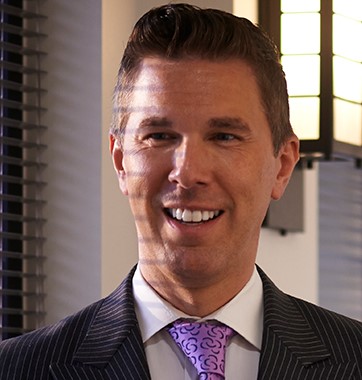Home > Region IV Reflections: Most Growth
To read more from other Region IV Reflectors, please click here.

Dr. Ray Kotwicki is the Charles B. West Chief Medical Officer at Skyland Trail, a nationally acclaimed private, nonprofit residential and day treatment organization for adults and adolescents with mental illnesses in Atlanta, Georgia. In this role, Dr. Kotwicki oversees all the clinical, educational, quality, and research activities within the organization.
Dr. Kotwicki trained as a Department of Energy Fellow, and was a Medical Scholar at the University of Wisconsin Medical School. He had post-graduate training at Harvard Medical School, the Boston University School of Medicine, and Emory University, where he earned a Master in Public Health degree in Health Policy and Management. He remains an adjunctive Associate Professor at the Emory University School of Medicine.
Over his career, Dr. Kotwicki has presented over 350 invited lectures, symposia, and seminars to tens of thousands of attendees. He regularly appears on television, radio and in newspaper articles discussing issues related to mental health and integrated medical care.
Located in Atlanta, Skyland Trail is a nationally recognized nonprofit mental health treatment organization serving adults ages 18 and older and adolescents ages 14 to 17. It is one of the nation's top mental health treatment centers with a voluntary treatment community of clients finding new ways to overcome the limitations of their mental illness and reclaim their lives.
Covid-19 disrupted so much in our lives - it disrupted our routines and the mechanisms we typically use to cope. For me the most challenging aspect has been the lack of control, the lack of information and the increase in ambiguity and unpredictability. The pandemic also magnified inequities including economic stability, racial and ethnic disparities in testing and supports, and more recently the emergence of a split country in vaccine access and acceptance.
I believe the most growth occurs during the hardest times. The pandemic has been a challenging time for us all but out of that we have seen growth. First, the experience of living through this pandemic has allowed us, as an organization, to be more thoughtful about how the complexities of the modern world impact the human experience and shape our health. This realization prompted us to develop a new curriculum for residential patients that focuses on ecological systems and the interrelationship of mental health with secular challenges like the pandemic, global climate change, and social injustices. Second, the pandemic highlighted the need for an increased focus on mental health and community support for one another, which I believe is a positive. I hope that focus on our well-being remains long after Covid-19.
The experience of living through this...has allowed us to be more thoughtful about how the complexities of the...world impact...[our] experience and shape our health.
Staff burnout became apparent quickly. We noticed a majority of our staff was not able to take time off initially. Recognizing that this was problematic, we worked from a resiliency perspective to help staff in a variety of ways. I hosted a virtual fire-side chat with staff to discuss what the latest data showed, provide public health updates, and share relevant information. We provided hazard pay to our front-line clinical staff, required staff to take personal time off to get away from work periodically, and instituted work-from-home days for direct care staff to ensure equity across the workforce. We had wellness initiatives such as virtual yoga, free lunch and staff care packages, virtual "social times" and friendly competitions, and opportunities to ask lots of questions. In short, the more communication and transparency was integral to staff feeling supported. Feeling uninformed, powerless, and ultimately responsible for serious decisions is the worst combination for good mental health.
More communication and transparency was integral to staff feeling supported.
Traveling and experiencing new cities, people, and culture has always been a way for me to recharge and cultivate personal resilience. Obviously that wasn't possible during the pandemic so every weekend my family and I would pull out photos or museum books we bought on past trips and virtually experience being in a different location. We cooked dinner from whatever place or country we were featuring, played some music from the trips, and pretended to be back in all of the places we love. Although it wasn't exactly the same, this expanded our worlds when it was easy to have a small world while isolating at home.
I also enjoy transporting myself to other times and places through art and reading. In addition to cooking new foods and recalling past trips, I committed to reading transformational books and engaging in new artforms as a way to transport my thinking and point of view outside of my individual experience. For example, I started listening to harpsichord music, which is theorized to be helpful in creating new connections between neurons in stroke patients. Not only did I find it enjoyable, but it felt stimulating to my brain and offered a topic to discuss with friends during virtual social get-togethers.
Physical exercise was another way that helped me find balance and hope. Engaging in movement - both literal and metaphoric - during stagnant times is of crucial importance to holistic health! Keep moving no matter what!
Books and...art...transport[ed] my thinking and point of view outside of my individual experience.
For so long many Americans have held onto this belief that being totally committed to work and making money determines happiness and success. This past year may have shaken that belief, and I think scheduling self-care will be as equally important as work itself. We'll have to do a better job of emphasizing and integrating self-care strategies in the formal training curriculums of mental health providers, medical students, and other direct-care providers. Similarly, more senior staff will need to shift our philosophies away from connecting self-sacrifice and over-working with being a great clinician or great doctor.